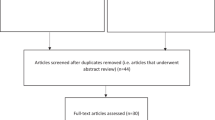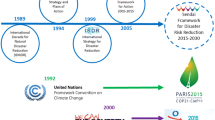Abstract
Purpose of Review
The purposes of this review are to analyze the medical response to the terrorist attacks of November 2015 in Paris and to outline the lessons learned in France that can be useful for other trauma care systems.
Recent Findings
The recent published reports and the occurrence of new attacks in Europe and North America demonstrate the need for civilian emergency medical service (EMS) systems to be prepared to face mass casualties of victims injured by powerful military weapons such as assault rifles or bombings. A terrorist attack is not a natural or a technological disaster; it is a strategy using surprise and violence to spread fear and panic.
Summary
Adaptability, aggressive training program, and mutual trust of all the services involved in the neutralization of terrorists or the rescue and the care of casualties are mandatory to provide an efficient global answer. This will not only save lives, it will be also the first step of resilience.

Similar content being viewed by others
References
Papers of particular interest, published recently, have been highlighted as: • Of importance •• Of major importance
Baker DJ, Telion C, Carli P. Multiple casualty incidents: the prehospital role of the anesthesiologist in Europe. Anesthesiol Clin. 2007;25:179–88.
Carli P, Telion C, Baker D. Terrorism in France. Prehosp Disaster Med. 2003;18:92–9.
de Ceballos JP, Turégano-Fuentes F, Perez-Diaz D, Sanz-Sanchez M, Martin-Llorente C, Guerrero-Sanz JE. 11 March 2004: the terrorist bomb explosions in Madrid, Spain—an analysis of the logistics, injuries sustained and clinical management of casualties treated at the closest hospital. Crit Care. 2005;9:104–11.
Lockey DJ, Mackenzie R, Redhead J, Wise D, Harris T, Weaver A, et al. London bombings July 2005: the immediate pre-hospital medical response. Resuscitation. 2005;66:ix–xii.
Roy N, Kapil V, Subbarao I, Ashkenazi I. Mass casualty response in the 2008 Mumbai terrorist attacks. Disaster Med Public Health Prep. 2011;5:273–9.
Gates JD, Arabian S, Biddinger P, Blansfield J, Burke P, Chung S, et al. The initial response to the Boston marathon bombing: lessons learned to prepare for the next disaster. Ann Surg. 2014;260:960–6.
Sollid JM, Rimstad R, Rehn M, Nakstad AR, Tomlinson AE, Strand T, et al. Collaborating group Oslo government district bombing and Utøya island shooting July 22, 2011: the immediate prehospital emergency medical service response. Scand J Trauma Resusc Emerg Med. 2012;20:3–13.
Tourtier JP, Palmier B, Tazarourte K, Raux M, Meaudre E, Ausset S, et al. The concept of damage control: extending the paradigm in the prehospital setting. Ann Fr Anesth Reanim. 2013;32:520–6.
Tourtier JP, Pelloux P, Minh PD, Klein I, Marx JS, Carli P. Charlie Hebdo attacks: lessons from the military milieu. Am J Emerg Med. 2015;33:843.
Service médical du RAID. Feedback on terrorist attacks on November 13, 2015. Bataclan’s terrorist attack management by the tactical medical support of the French Police. Ann Fr Med Urgence. 2016;6:3–8. In French English abstract
Nahon M, Poirot N, Marx JS, Lejay M, Tartière S, Chastre C, et al. Feedback on terrorist attacks on November 13, 2015. The medical zonal regulation. Ann Fr Med Urgence. 2016;6:16–21. In French, English abstract
Haug CJ. Report from Paris. N Engl J Med. 2015;373:2589–93.
Borel M, Le Saché F, Pariente D, Castro S, Delay M, Bouhaddou A, et al. Feedback on terrorist attacks on November 13, 2015. Mass casualty management in trauma center. Ann Fr Med Urgence. 2016;6:22–30. In French, English abstract
Hirsch M, Carli P, Nizard R, Riou B, Baroudjian B, Baubet T, et al. The medical response to multisite terrorist attacks in Paris. Lancet. 2015;386:2535–8. First report of the Paris attacks
•• Carli P, Pons F, Levraut J, Millet B, Tourtier JP, Ludes B, et al. The French emergency medical services after the Paris and Nice terrorist attacks: what have we learnt? Lancet. 2017;390:2735–8. A comprehensive analysis of the lessons learned by the EMS system in France after major attacks
Philippe JM, Brahic O, Carli P, Tourtier JP, Riou B, Vallet B. French Ministry of Health’s response to Paris attacks of 13 November 2015. Crit Care. 2016;20:85.
French Republic, Ministère des affaires sociales et de la santé, Décret no 2016-1327 du 6 octobre 2016 relatif à l’organisation de la réponse du système de santé (dispositif « ORSAN ») et au réseau national des cellules d’urgence médico-psychologique pour la gestion des situations sanitaires exceptionnelles NOR: AFSP1617819D.
Goralnick E, Van Trimpont F, Carli P. Preparing for the next terrorism attack: lessons from Paris, Brussels, and Boston. JAMA Surg. 2017;152:419–20.
• Gold A, Strous RD. Second thoughts about who is first: the medical triage of violent perpetrators and their victims. J Med Ethics. 2017;43:293–300. An important analysis of the ethics of terrorist care
Goralnick E, Van Trimpont F, Carli P. A unique program to incorporate volunteers into a nationwide emergency medical system-reply. JAMA Surg. 2017;152:1089.
Author information
Authors and Affiliations
Corresponding author
Ethics declarations
Conflict of Interest
The authors declare no conflicts of interest relevant to this manuscript.
Human and Animal Rights and Informed Consent
This article does not contain any studies with human or animal subjects performed by any of the authors.
Additional information
This article is part of the Topical Collection on Disaster Trauma
Rights and permissions
About this article
Cite this article
Carli, P., Telion, C. Paris City Disaster: Response to the Recent Terror Attacks and Lessons Learned. Curr Trauma Rep 4, 96–102 (2018). https://doi.org/10.1007/s40719-018-0119-1
Published:
Issue Date:
DOI: https://doi.org/10.1007/s40719-018-0119-1




